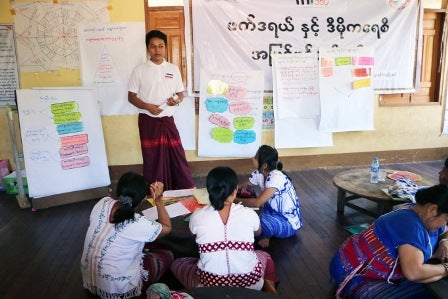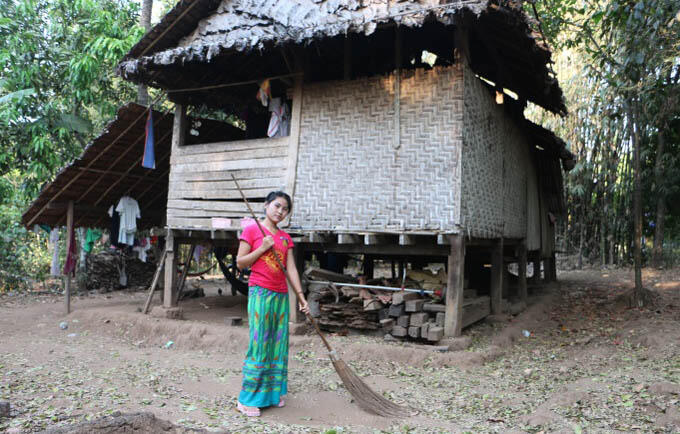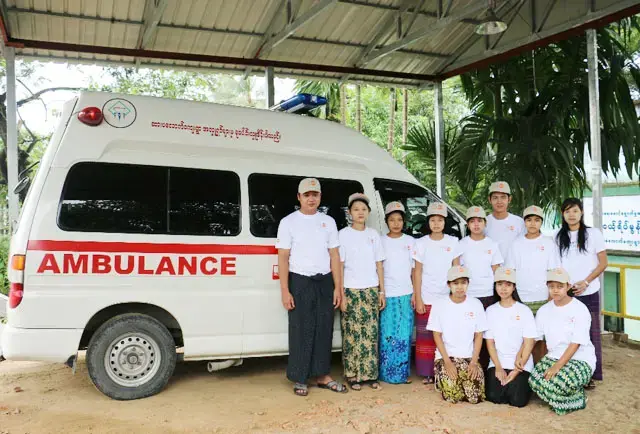The drive to Kat Pa Li Village in Kayin is breath taking. Limestone hills lie bare amid patches of cultivation and green forest. Smoke rising from hamlets under the setting sun completes the picture.
“It was quite different when my parents were my age. Everyone wanted to be home well before sunset lest they might be caught in the fighting,” says Saw Naung Hein, 26. “In those days, people lived in anxiety. Fighting could and did erupt anywhere. I remember the home-made bunkers in my neighbourhood where whole families hid during fighting.”
Kayin witnessed one of the world’s longest civil wars, almost six decades long. Whole generations were born and died during the conflict. Up until a few years ago, people were still afraid that the fighting would start again. Some still are.
“We have suffered so much in the past. Young people were affected as much as adults. Many could not go to school as there would be no teachers, and that’s just one issue. What we want now is sustained peace so that we can move forward. Our people deserve that,” says Saw Naung Hein.
“The workshop is a good start after all these painful years”
UNFPA, the United Nations Population Fund, believes that young people are at the core of a more sustainable, inclusive and participatory future. For this reason, it works to give young people a voice in Myanmar’s peace process.
As part of this work, UNFPA sponsored Saw Naung Hein and 25 other young peace activists from across Myanmar to attend a workshop on youth, peace and security in Yangon in March 2017. Supported by UNFPA, UN Volunteers, other UN partners, and the Peace Support Fund, the workshop focused on UN Security Council Resolution 2250, which recognizes the positive role youth can play in conflict prevention, peace building, and prevention of violent extremism. For Saw Naung Hein, meeting young peace activists from other parts of the country was an important part of the workshop.
“I learnt about issues that youth in other states and regions are facing. There is still fighting in many areas. We all agreed that young people must participate in the peace process, and we need our voices to be heard. We still have a long way to go, but this is a good start after all these painful years.”
“Although there is no longer any fighting, we still bear the scars of it”

Since 2016, Saw Naung Hein has worked for the civil society organization Karen Affairs Committee. After the UNFPA supported workshop in Yangon, Saw Naung Hein returned to his home state with a wealth of new ideas that he is now integrating into community awareness sessions on federalism and democratic principles that he facilitates across Kayin. At the session in Kat Pa Li village he talks with new confidence about the need to involve young people in community peace building.
One of the Kat Pa Li villagers joining Saw Naung Hein’s session is 19 year old Nan Su Su Naing. While studying for a bachelor degree through the University of Distance Education, she does household and farm work in the family smallholding. She wants to become a teacher.
“In the session I’ve learned about peace, federalism, security and democracy. They are all linked. I was born in a place torn by conflict, and I realize the importance of peace. Although there is no longer any fighting, we still bear the scars of it,” says Nan Su Su Naing.
Saw Naung Hein knows that his work for peace is making a difference to Nan Su Su Naing and other young people in Kayin. But he wishes he could do more.
“Now I am doing what I can. Yet, it is not enough. I work for peace with local communities. But we also have to empower young people nationwide. That means a lot of resources and a synchronized action plan. I am already discussing this with the new friends I made during the UNFPA supported workshop in Yangon. Now I want to find out more about what we could and should do together to build a better future for younger generations.”




